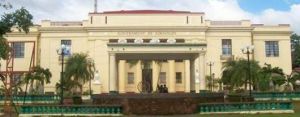- The Provincial Capitol of Sorsogon. Photo credit
Sorsogon politics is currently dominated by two families– the Escuderos and the Lees. The Escuderos keep a tight rein over the first district, while Raul and Sally Lee enjoy a 25-year grip over the provincial capitol. These dynasties form alliances with smaller political clans, like the Dionedas of Sorsogon City and the De Castos of Bulan, to ensure a stronger grip on their power.

Six Degrees of Separation between Sorsogon politicos: Salvador “Sonny” Escudero III, Deogracias “Ding” Ramos, Eric Dioneda, Raul Lee, Vladimir Frivaldo, and Antonio “Kruni” Escudero Jr.
Politics in Sorsogon is like a game of Six Degrees of Separation where you can link all politicians to each other in six degrees or less – the Escuderos, for example, are allied with Rep. Deogracias Ramos of the second district. Ramos broke Liberal Party (LP) protocol by supporting the gubernatorial aspirations of Nationalist People’s Coalition (NPC) candidate Eric Dioneda, son of Sorsogon City mayor Leovic Dioneda and a fierce opponent of the Lees. Incidentally, Ramos used to be allied with Raul Lee but broke ties in 2010 when the latter fielded a different candidate for congressman in the second district. Ramos’ support for Dioneda earned the ire of fellow LP member and provincial board member Vladimir Frivaldo, grandson of the late ex-governor Juan Frivaldo, who was also a bitter opponent of the Lee dynasty. The younger Frivaldo recently filed a plunder case against Raul Lee, and is seeking a vice-gubernatorial seat in this year’s elections. He will be facing incumbent vice governor Antonio Escudero Jr. of the Escudero dynasty.
A few people are rising up to the challenge of knocking down the strongholds held by the political clans. Incumbent provincial board member Arnulfo Perete, for example, is set to break the 16-year hold of the Escuderos over the first congressional district. Renato Laurinaria, a long-time mayor of Castilla town, former police officer, and staunch anti-insurgency advocate, has the backing of the adminstration’s Liberal Party to face off with Lee and Dioneda for the gubernatorial post.
This election season, Sorsogon is only second to Masbate when it comes to the number of villages condidered election hot spots. This is attributed not to political violence in the province but because of the strong presence of the rebel group New People’s Army (NPA) in a number of its villages. Arguably, the influence of the NPA is directly related to the poverty incidence in Sorsogon, which while improved at 32.1% in 2012 still remains in the top third of the country’s poorest provinces. Even the government admits that the rebel group’s presence is strong in far-flung barrios where there are more marginalized, poor people.
The people of Sorsogon can only hope that a new set of leaders in this year’s elections can bring positive change to their lives and livelihoods.
The Escudero Dynasty
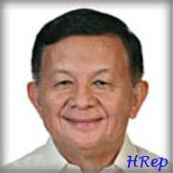
Salvador “Sonny” Escudero III. Photo credit
The Escudero dynasty is the oldest in the province, with a political career spanning a century. Salvador “Gurang” Escudero Sr. entered politics in 1912 as councilor of Casiguran town and went on to become town mayor, provincial board member, and governor. When the Japanese occupation broke out in 1942 he led one of the three guerilla units of the province. He served nine more years as provincial governor from 1946 to 1955. His brother, Manuel Escudero, represented Sorsogon in the 4th Philippine Assembly from 1916-1919.
Salvador Escudero Jr., followed in his father’s footsteps as Casiguran mayor and provincial board member. The third Salvador Escudero, known as Sonny, represented Sorsogon in the Marcos-era Regular Batasang Pambansa from 1984 to 1986. He consolidated the family’s political base in the first district by keeping six terms as congressman – from 1987 to 1998 and then from 2007 to 2012. He died in 2012 before finishing his sixth term. His son, Francis “Chiz” Escudero, took over his father’s reign as first district congressman from 1998 to 2007 before winning a Senate seat in 2007. Sonny’s wife, Evelina, is poised to keep the family’s 25-year rule over the first district by running as congresswoman in this year’s elections.
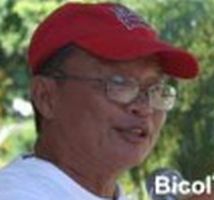
Antonio “Kruni” Escudero Jr. Photo credit
Another Escudero in Sorsogon politics is Sonny Escudero’s brother, Antonio Escudero Jr. He was provincial vice governor from 1992 to 1995 and then from 1998 to 2007. In 2007 he ran for governor but lost to Sally Lee. In 2010 he reclaimed his vice gubernatorial seat, and is aiming to seek another term in this year’s elections. Antonio’s son, Krunimar Escudero II, is eyeing a position in the province’s legislative board.
Ramon Escudero, half-brother of Sonny and Antonio Jr., keeps court at Casiguran. He was town councilor from 2004 to 2007 and is currently the town’s vice-mayor. He is seeking a second term in this year’s elections. Oscar, their cousin, was Casiguran mayor from 1992 to 1995.
The Lee Dynasty versus Juan Frivaldo
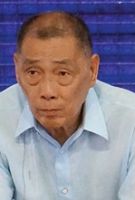
Raul Lee. Photo credit
The Lees have manned the helm at the provincial capitol for the last 25 years. Raul Lee was a son of a Chinese immigrant. He had his name changed to Rorigueza when he became a Filipino citizen but chose to use his birth name when he entered politics. Lee started out as barangay captain in 1968 before becoming Sorsogon City councilor and then mayor from 1970 to 1978. After ten years in city politics, Raul set his sights on the provincial capitol and the gubernatorial seat held by 18-year governor Juan Frivaldo. Thus began the decades-long battle between the Lees and the Frivaldos.
Juan Frivaldo was born to poor parents in Sta. Magdalena. He and Sonny Escudero belonged to the same guerilla unit during the Japanese occupation. In 1955 Frivaldo ran and won as governor without any experience in politics. In 1959 he was personally picked by President Ramon Magsaysay for the gubernatorial race. By the 1970s he was a formidable politician, having been governor from 1955 to 1967 and from 1971 to 1977. His term was cut short in 1978 when he was ousted by the Ferdinand Marcos autocracy and replaced by his crony Raul Lee. By this time Frivaldo was a target of political harrassment due to his staunchly anti-adminstration stand. He survived two assasination attempts – one in 1971 and then again in 1975. Fearful for his life, he left the country and went on self-imposed exile in Iran and then the United States.
After the People Power uprising in 1986 which ousted Marcos, Frivaldo went home and sought a congressional seat in his district but lost to Marcos crony Sonny Escudero. He sought to reclaim his seat at the provincial government in 1988, and unseated Raul Lee. A disqualification case was filed against Frivaldo because of the American citizenship he acquired during his nine-year exile. Lee was able to regain his throne in 1989. The two battled it out again in the 1992 elections with Frivaldo emerging as the winner. A few weeks shy of the 1995 elections Frivaldo was removed from office due to his questionable citizenship. Undeterred, he still ran in the polls and won his seventh term (not consecutively) as governor. At this point the Frivaldo-Lee square-off was a hot topic in national dailies as well as in law circles. Despite the questions on his citizenship, Frivaldo’s winning of the 1995 polls was upheld by the Commision on Elections (Comelec) because he was the “overwhelming choice” of the Sorsogeneo voters. This earned him the monicker the “last American governor of the Philippines”, a title given by his ally the then President Ferdinand Ramos.
The struggle between Frivaldo and Lee further escalated in 1998 when the two locked horns once more in the gubernatorial race. This time Lee was declared a winner, a matter that was hotly contested by Frivaldo. He filed an electoral protest on the ground of fraud, terrorism and vote-buying. Frivaldo died in 2000 without seeing the resolution of his protest case. The Comelec recount that wrapped up after his death found him to have beaten Lee by 4,000 votes.
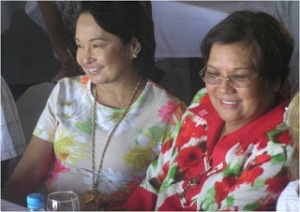
Sally Lee (left) with then President Gloria Macapagal-Arroyo in 2010. Photo credit
The death of Juan Frivaldo made it easier for the Lee dynasty to cast an iron grip over the province. Raul Lee went on to become governor from 2001 to 2007. He had to field his wife Sally Ante Lee to take his place in 2007. Prior to her gubernatorial stint Sally was Sorsogon City mayor from 2000 to 2007. Currently Raul is provincial governor, and is seeking re-election for his seventh shot (again, not consecutively) in the same post. Sally is gunning to reclaim her post as Sorsogon City mayor versus incumbent Leovic Dioneda.
The rest of the Lee family seems to be biding their time in politics: Raul and Sally’s son, Robert Rodrigueza, is curently vice mayor of Sorsogon City. Another son, Patrick, is Sanguunian Kabataan (SK) chair. Both are not running in this year’s elections. Their sister Christine Lee Rodrigueza-Balita initially filed her certificate of candidacy for Sorsogon City mayor but withdrew at the the last minute in favor of her mother Sally.
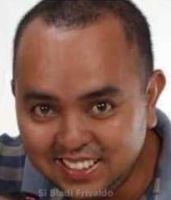
Vladimir Frivaldo. Photo credit
As for the Frivaldos, two of their family are currently occupying posts at the provincial government. Francisco Frivaldo, a son of Juan, is currently a member of the provincial legislative board. He is accompanied by his nephew Vladimir Frivaldo, who is eyeing the vice gubernatorial post in this year’s elections. He also filed a graft case versus Raul Lee with the Ombudsman for approving the purchase of fertilizers worth P180 per liter for a bloated price of P1,500 per liter.
